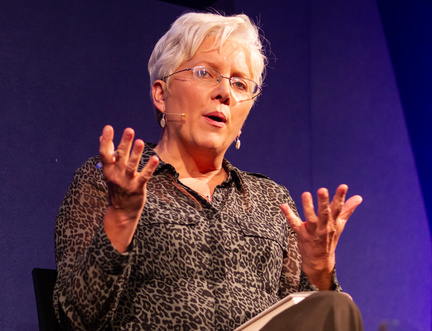More articles Saturday 24 August 2019 5:00pm
Inequality in pay is an “issue of justice” that we should all be looking at, says Carrie Gracie.

“It turns into a situation where the cover up is worse than the crime, because you had the original thing where you were valued less.” Scottish journalist Carrie Gracie, involved recently in a battle with the BBC for wage parity with her male peers, discussed her new book, Equal, the importance of equality in the workplace and how important it is that she stands up for less privileged women at the Book Festival last night.
Gracie’s battle began in 2017 when the BBC was forced to reveal details of its salaries above the £150,000 earned by the Prime Minister. During this time, Gracie was then working in China as the BBC’s China Editor. She had reservations about taking the role due to a suspicion that she wouldn't be paid an equal figure to her male counterparts and agreed that she would only accept the job on the basis that she would be - an arrangement which she saw as the end of the discussion.
“When I went to China I knew it was going to be a huge job and had huge sacrifices to go there, I would make sacrifices to do it, my kids would make sacrifices for me to go and do it.”
When the salary figures were released, Gracie discovered that despite earning a generous salary, she was being paid almost half the amount her male counterparts were for the same work. “We (the women at the BBC) kind of went, ‘hang on, there’s something wrong here, you’ve been telling us that we’re equal or roughly equal, but actually now that we have these numbers we realised that we just aren’t.”
“Often, unfortunately, in my view, women are not getting a fair crack here because what employers do is use all of the excuses in the book and they are numerous. To fob women off, distract them, delay, exhaust them, make them feel that they’re less, you know, because that’s what happens in an equal pay claim.”
Over the course of 2017, Gracie would take her research into employment law seriously, becoming a "second job”, ironically given that her 'first job' was with a company that appeared to value her less than her male co-workers. It was during a grievance meeting at the end of 2017, an event she was not permitted to record, that Gracie realised the insidious nature of the issue.
“Now notes are something that are obviously produced in all kinds of situations, but for BBC reporters it is an article of faith that your notes are good notes and accurately reflect the conversation you had with your interviewee. It’s not an option to make bad notes and misquote the interviewee.
Gracie made a statement to a hearing committee, during which she wasn’t allowed to make an audio recording and was “interrupted with questions”. When she received a copy of the notes of the meeting, it made her question if something more sinister was afoot. “The notes were utterly unrecognisable. They were full of errors and omissions and additions.”
For Gracie, it was incredibly difficult “to see this come back as a rendition of my voice...my voice and my own hearing produced in this absolute incoherent gibberish.”
“I wrote to them, kind of pretty much saying exactly that and they wrote back offering counselling.
“It’s kind of like funny at one level, but on another level, it’s not at all funny because workplaces are quite top down… they can get quite totalitarian in their behaviour. It is one of the paradoxes of the liberal west that we think we’re all into freedom of speech and all the rest of it… but we deal with censorship, we deal with intimidation, we deal with quite a lot of top down messaging.”
Carrie has since finished her battle with the BBC, supported by women who should have been her rivals but instead have been soldiers fighting with her to defeat a common enemy: misogyny. She says that for her, one of the most important things about this whole episode was the need to fight, not because she needed the money, but because she had the privilege of being in a position to make change.
“If you’re a person of privilege, you need to get out and work on behalf of the people.
“I think men do need to acknowledge that this is not a private issue between one woman and the boss. This is an issue for them. It is an issue of justice and it is in their interests, they need to start framing this self-interest more widely, to understand this and take it on and to show solidarity. It’s a question of justice and it’s one they need to engage in. So, you know, we need to get out and grab men by the collar and say, ‘just please join us.”
- 2026 Festival:
- 15-30 August
Latest News
 Major new partnership with Celtic Connections
Major new partnership with Celtic Connections



